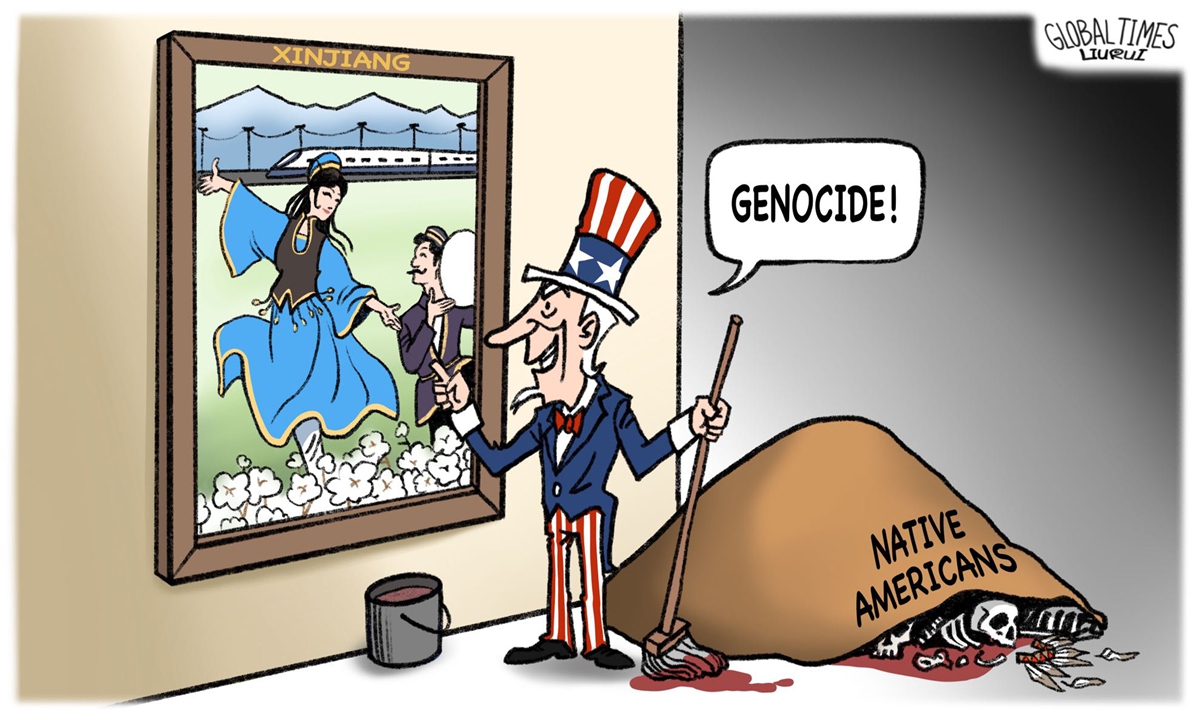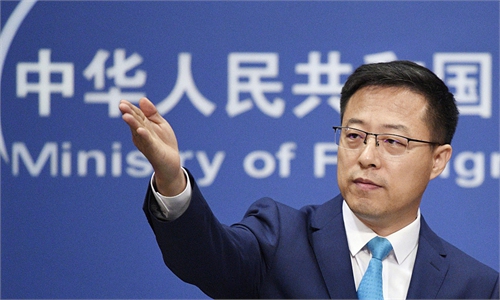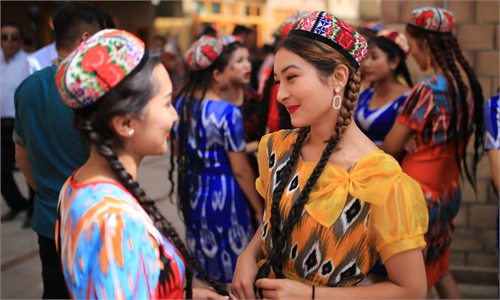OPINION / GLOBAL MINDS
West falls into shameless narcissism over Xinjiang

Xinjiang Illustration: Liu Rui/GT
Some so-called human rights organizations controlled by the West have recently launched a violent attack on the UN High Commissioner for Human Rights Michelle Bachelet. German pseudo-scholar Adrian Zenz, who has long distorted the situation in China's Xinjiang, even called on Bachelet to resign. Bachelet did not publicly criticize the Chinese government as those human rights organizations wished. Instead, she said she had wide interactions with local officials and residents in Xinjiang and expressed concerns about whether China's counter-terrorism policies in Xinjiang meet international human rights standards, but did not criticize it.
Bachelet has emphasized many times that her visit to Xinjiang was not an investigation, but an opportunity to better understand China's situation and let the Chinese government know their concerns better.
I believe that any Western human rights official who does not fully take a side will not reach the extreme conclusions of Western human rights organizations. Over recent years, China has made brilliant achievements in the basic areas of human rights, including improving people's living standards, protecting the rights of women and children, promoting the development of ethnic minority areas, and implementing national healthcare and pension systems. China has in fact completely rewritten its human rights situation, and whoever visits China can see this. Unless speaking against their own conscience, it is impossible for the UN high commissioner for human rights to follow the tone of these "human rights organizations" and accuse China.
Xinjiang was once plagued by terrorist activities. The need to rebuild peace and stability in the region is understandable to anyone without prejudice. I believe that when Bachelet arrived in Xinjiang, what she actually saw and heard are also very different from what the Western media has been propagating.
Bachelet made it clear that her communication with local people in Xinjiang during her visit was independent and was not unsupervised. She should have seen and felt that the peace and tranquility of Xinjiang today is generally welcomed by the local people of all ethnic groups.
Western political and public opinion elites think that they are the only ones who care most about the human rights of Xinjiang Uygurs. They have really fallen into a shameless moral narcissism. It is the Chinese government that cares the most about Uygurs' well-being, ensuring they live well and that their basic rights are protected the same way as other ethnic groups are. This is the responsibility of the Chinese government, as well as the foundation of long-term stability in Xinjiang, not to mention the basic morality of humanitarianism.
Just look at the human rights record in the West, especially in the US. The US has brutally pursued social Darwinism in handling the COVID-19 pandemic, completely accepting mass deaths amongst low-income people and minorities. Gun violence in the US continues to spread, and US leaders have not taken any truly effective measures except expressing some mourning words and doing on-the-spot condolences.
At the same time, Washington pays such high attention to human rights in Xinjiang, including those human rights organizations headquartered in the West. We have never seen them so excitedly condemn those human rights tragedies in the West, yet they have attacked Xinjiang's human rights policies so vigorously. Aren't they hypocritical? Haven't they done it for geopolitical reasons?
The Chinese government governs a super-large society of 1.4 billion people, and serving the people is the fundamental purpose of the Communist Party of China. We will manage Xinjiang well. We really don't need Western politicians and human rights organizations to pretend to care about human rights in Xinjiang.
To make Bachelet's visit possible, China and the UN Commission for Human Rights have repeatedly conducted communication, and the final visit was carried out, which shows that the two sides have reached an important consensus. This visit will definitely impose a positive effect on promoting exchanges between the two sides.
To be honest, Bachelet's public briefing on the visit contained many words that China do not want to hear. For example, she expressed her doubts and concerns about the widespread implementation of anti-terrorism and deradicalization measures, especially the lack of independent judicial supervision of the operation plan of vocational education and training centers. All of this imply the distorted tone of Western public opinion on Xinjiang affairs. However, the Chinese side did not raise the issue with Bachelet and has always respected her.
The US State Department declared Bachelet's visit as a "mistake" before she even traveled to China, claiming that she would not be granted access to so-called sensitive areas. The UK and other US allies put pressure on Bachelet at the same time, and they also coordinated the release of materials exposing so-called suppression in Xinjiang. All of these acts were aimed at influencing Bachelet and forcing her to write a human rights report that would help the US strategically suppress China.
However, the report released by the UN Commission for Human Rights fell far short of the hopes of Washington and London, so those human rights groups have come forward and attacked Bachelet very fiercely, claiming that she had fallen into Chinese government's propaganda. They really don't have the slightest respect for the UN Commission for Human Rights. They just want to use it as a tool, and if the tool deviates in any way, they will mobilize the public opinion machine to criticize it.
However, facts are always stronger than lies. The US cannot change the situation of Xinjiang. It can never create a false "fact" of Xinjiang, and make the world follow and declare it is true.
The author is a commentator with the Global Times. opinion@globaltimes.com.cn




